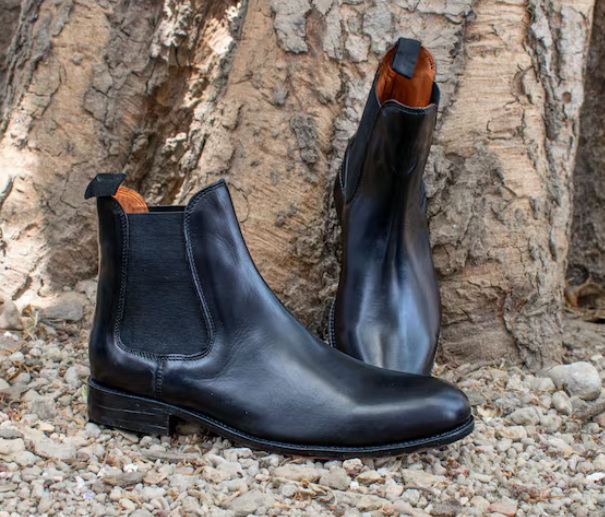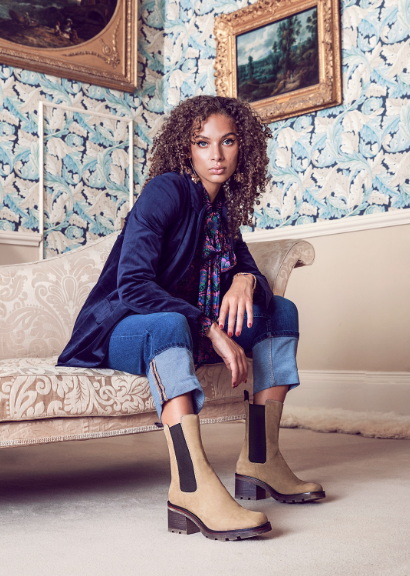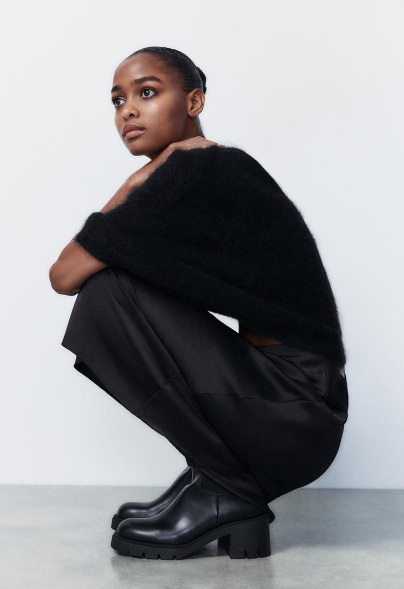Content Menu
● Understanding Chelsea Boot Design
● Factors Affecting Chelsea Boot Fit
>> 1. Brand Variations
>> 2. Material
>> 3. Foot Shape
>> 4. Intended Use
● How Chelsea Boots Should Fit
● Sizing Guide for Chelsea Boots
● Tips for Finding the Right Fit
● Common Sizing Issues with Chelsea Boots
>> Heel Slippage
>> Tight Instep
>> Loose Ankle
● Breaking In Chelsea Boots
● Caring for Your Chelsea Boots
● Styling Chelsea Boots
● Conclusion
● FAQ
>> 1. How tight should Chelsea boots be?
>> 2. Should I size up or down for Chelsea boots?
>> 3. How do I know if my Chelsea boots are too big?
>> 4. Can Chelsea boots stretch over time?
>> 5. How long does it take to break in Chelsea boots?
● Citations:
Chelsea boots have become a staple in many wardrobes, offering a perfect blend of style and versatility. However, one question that often arises when purchasing these iconic boots is whether they fit true to size. In this comprehensive guide, we'll explore the intricacies of Chelsea boot sizing, factors that affect their fit, and tips to ensure you find the perfect pair for your feet.

Understanding Chelsea Boot Design
Chelsea boots are characterized by their ankle-high design and elastic side panels, which allow for easy slip-on and slip-off[8]. This unique construction can impact how the boots fit compared to other footwear styles.
Key features of Chelsea boots include:
- Elasticated side panels
- Pull tabs for easy wear
- Ankle-height design
- Sleek, minimalist appearance
Factors Affecting Chelsea Boot Fit
Several factors can influence how Chelsea boots fit:
1. Brand Variations
Different brands may have slightly different sizing standards[4]. For example, some brands recommend sizing up half a size, while others suggest staying true to size.
2. Material
The material of the boot can affect its fit. Leather Chelsea boots may initially feel snug but will stretch and mold to your feet over time[5].
3. Foot Shape
Individual foot shapes can impact how Chelsea boots fit. Those with wider feet may need to consider wider-fit options or size up[7].
4. Intended Use
Consider how you plan to wear the boots. If you'll be wearing them for long periods or with thick socks, you might want to size up slightly[7].
How Chelsea Boots Should Fit
Ideally, Chelsea boots should fit snugly around the foot without being too tight. Here are some key points to consider:
- The boots should be snug across your ankle but not so tight that they're difficult to put on or take off[2].
- There should be a little flexibility in the boots, thanks to the elastic vents[2].
- Your toes should have enough room to wiggle slightly[9].
- The heel should not slip excessively when walking[9].
Sizing Guide for Chelsea Boots
While sizing can vary between brands, here's a general guide to help you find the right fit:
| | | | | | | | |
| Chelsea Crew Size | 35 | 36 | 37 | 38 | 39 | 40 | 41 | 42 |
| US Size | 4 - 4.5 | 5 - 5.5 | 6 - 6.5 | 7 - 7.5 | 8 - 8.5 | 9 - 9.5 | 10 - 10.5 | 11 - 11.5 |
| UK Size | 2 - 2.5 | 3 - 3.5 | 4 - 4.5 | 5 - 5.5 | 6 - 6.5 | 7 - 7.5 | 8 - 8.5 | 9 - 9.5 |
| EU Size | 35 | 36 | 37 | 38 | 39 | 40 | 41 | 42 |
| Length (in.) | 8.3 - 8.5 | 8.6-8.8 | 9.0-9.1 | 9.3-9.5 | 9.6-9.8 | 10.0-10.1 | 10.3-10.5 | 10.6-10.8 |
| Length (cm.) | 21.1-21.6 | 21.8-22.2 | 22.8-23.2 | 23.6-24.1 | 24.3-24.8 | 25.4-25.7 | 26.1-26.7 | 26.9-27.5 |
| 4 | | | | | | | | |
Tips for Finding the Right Fit
1. Measure Your Feet: Place a piece of paper on the floor against a wall. Stand on it with your heel touching the wall and mark where your longest toe ends. Measure this length and use it to determine your size using the chart above[7].
2. Try Boots On in the Afternoon: Feet tend to swell slightly throughout the day, so trying on boots later can help you avoid buying boots that are too small[7].
3. Walk Around: Be sure to walk around in the boots to ensure they're comfortable and don't slip at the heel[7].
4. Consider Sock Thickness: If you plan to wear thick socks with your Chelsea boots, you may need to size up slightly[2].
5. Check Brand-Specific Recommendations: Some brands may have specific sizing recommendations. For example, Blundstone uses Australian sizing, which differs from UK sizing conventions[7].

Common Sizing Issues with Chelsea Boots
Heel Slippage
Some heel slippage is normal in new Chelsea boots, as the sole needs to flex and break in. However, excessive slippage can lead to blisters and discomfort[9].
Tight Instep
If the instep feels tight, it may indicate that the boots are too small or that you need a wider fit[9].
Loose Ankle
By design, Chelsea boots will always have some looseness around the ankle to allow your foot to slip in and out. However, if it feels excessively loose, the boot may be too large[9].
Breaking In Chelsea Boots
New Chelsea boots, especially those made of leather, may require a breaking-in period. Here are some tips to make this process more comfortable:
1. Wear them around the house for short periods initially.
2. Use thick socks to help stretch the leather slightly.
3. Apply leather conditioner to soften the material.
4. Use a boot stretcher for particularly tight spots.
Remember, while some initial snugness is normal, Chelsea boots should never be painful to wear.
Caring for Your Chelsea Boots
Proper care can help maintain the fit and longevity of your Chelsea boots:
- Clean and polish regularly to keep the leather supple.
- Use shoe trees when not wearing the boots to maintain their shape.
- Rotate your boots to allow them to rest between wears.
- Resole when necessary to maintain the boot's structure.
Styling Chelsea Boots
Chelsea boots are incredibly versatile and can be styled in numerous ways:
- Pair them with slim-fit jeans for a classic look.
- Wear them with a suit for a modern, stylish office outfit.
- Match them with chinos for a smart-casual ensemble.
- For women, Chelsea boots can complement dresses and skirts for an edgy look.
The key is to ensure your pants or jeans sit just above or slightly over the boot's opening for the most flattering appearance.
Conclusion
While Chelsea boots may not always fit true to size due to variations in brand, material, and individual foot shape, understanding these factors can help you find the perfect fit. Remember to measure your feet, consider the brand's specific sizing recommendations, and always try on boots before making a purchase. With the right fit, Chelsea boots can be a comfortable and stylish addition to your footwear collection, suitable for various occasions and outfits.

FAQ
1. How tight should Chelsea boots be?
Chelsea boots should fit snugly around your foot and ankle without being uncomfortable. There should be enough room for your toes to wiggle slightly, and you shouldn't experience excessive heel slippage when walking.
2. Should I size up or down for Chelsea boots?
This can vary depending on the brand and your foot shape. Some brands recommend sizing up half a size, while others suggest staying true to size. It's best to consult the brand's specific sizing guide and measure your feet for the most accurate fit.
3. How do I know if my Chelsea boots are too big?
If your Chelsea boots are too big, you may experience excessive heel slippage, your foot sliding forward in the boot, or a large gap around the ankle area. The boot should feel secure on your foot when walking.
4. Can Chelsea boots stretch over time?
Yes, especially if they're made of leather. Chelsea boots can stretch slightly and mold to your feet over time, which is why a snug initial fit is often recommended.
5. How long does it take to break in Chelsea boots?
The break-in period for Chelsea boots can vary, but typically it takes about 3-4 weeks of regular wear for leather boots to fully adapt to your feet. Some boots may feel comfortable right away, while others might take longer to break in.
Citations:
[1] https://www.portlandleathergoods.com/pages/mens-chelsea-boot-size-guide
[2] https://pavers.us/pages/faq_womens-chelsea-boots
[3] https://blog.wordvice.cn/title-capitalization-rules-for-research-papers/
[4] https://chelseacrew.com/pages/size-chart
[5] https://www.chelseaboot.com/pages/faqs
[6] https://www.rmwilliams.com/footwear/men/chelsea-boots?lang=en_US
[7] https://chelseabootstore.com/size-guide/
[8] https://www.ahume.co.uk/blog/chelsea-boots-the-ultimate-buyers-guide/
[9] https://www.reddit.com/r/Boots/comments/18fzehu/chelsea_boots_sizing/
[10] https://www.gentlemansgazette.com/chelsea-boots-guide/

















